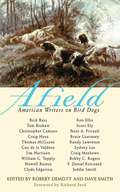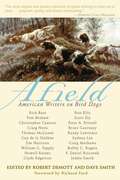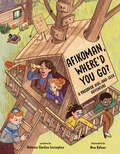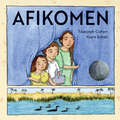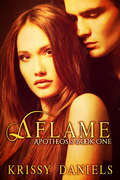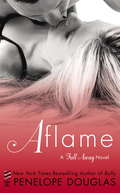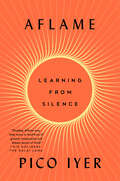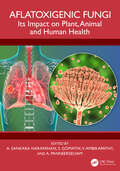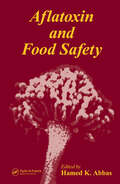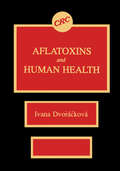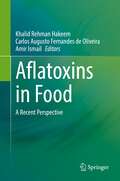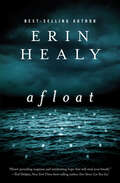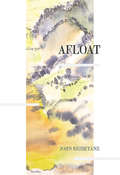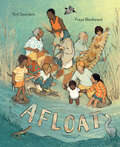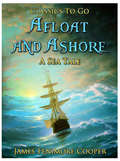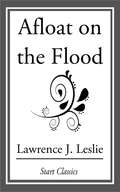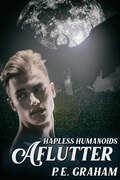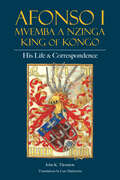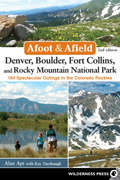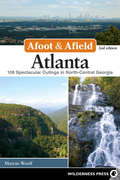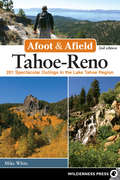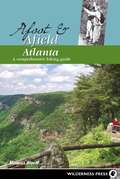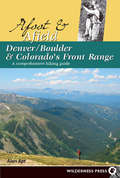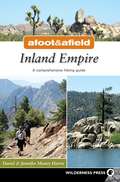- Table View
- List View
Afield
by Richard Ford Robert Demott Dave SmithThis marvelous collection features stories from some of America's finest and most respected writers about every outdoorsman's favorite and most loyal hunting partner: his dog. For the first time, the stories of acclaimed writers such as Richard Ford, Tom Brokaw, Howell Raines, Rick Bass, Sydney Lea, Jim Harrison, Tom McGuane, Phil Caputo, and Chris Camuto, come together in one collection. Hunters and non-hunters alike will recognize in these poignant tales the universal aspects of owning dogs: companionship, triumph, joy, forgiveness, and loss. The hunter's outdoor spirit meets the writer's passion for detail in these honest, fresh pieces of storytelling. Here are the days spent on the trail, shotgun in hand with Fido on point-the thrills and memories that fill the hearts of bird hunters. Here is the perfect gift for dog lovers, hunters, and bibliophiles of every makeup. This is a delightful, handsome volume that captures the wild spirit of dogs and those who love them.
Afield: American Writers on Bird Dogs
by Richard Ford Robert Demott Dave SmithThis marvelous collection features stories from some of America's finest and most respected writers about every outdoorsman's favorite and most loyal hunting partner: his dog. For the first time, the stories of acclaimed writers such as Richard Ford, Tom Brokaw, Howell Raines, Rick Bass, Sydney Lea, Jim Harrison, Tom McGuane, Phil Caputo, and Chris Camuto, come together in one collection. Hunters and non-hunters alike will recognize in these poignant tales the universal aspects of owning dogs: companionship, triumph, joy, forgiveness, and loss.The hunter's outdoor spirit meets the writer's passion for detail in these honest, fresh pieces of storytelling. Here are the days spent on the trail, shotgun in hand with Fido on point-the thrills and memories that fill the hearts of bird hunters. Here is the perfect gift for dog lovers, hunters, and bibliophiles of every makeup. This is a delightful, handsome volume that captures the wild spirit of dogs and those who love them.
Afikoman, Where'd You Go?: A Passover Hide-and-Seek Adventure
by Rebecca Gardyn LevingtonHelp the children find the afikoman during their seder! It&’s a rambunctious Passover hide-and-seek story for fans of Where&’s Waldo? and The Gingerbread Man. This lively, funny picture book brings to life the Passover tradition of searching for the afikoman—literally. When the mischievous piece of matzoh runs and hides during the seder, all the kids in the family (and even the pet dog!) go hunting for it, through every room in the house. Readers can join the hunt and find the sneaky afikoman in each bright and busy scene while enjoying the playful rhyming text. And they&’re in for a surprise ending that&’s as delightful as this favorite part of Passover.
Afikomen
by Tziporah CohenIn this wordless time-travel adventure, three children at a Passover seder visit ancient Egypt to help baby Moses find his way safely to Pharaoh’s daughter. When a family settles at the table for Passover, their dog nabs the afikomen bag (containing matzah used for the seder) and dives under the tablecloth. The children follow him and find themselves transported to ancient Egypt. There, they see baby Moses’ mother and sister Miriam placing him in a reed basket. The baby’s journey down the Nile is hazardous — he encounters several obstacles along the way, including a wily crocodile. Thanks to the three children, he reaches his destination unharmed, with a piece of afikomen tucked into his basket. The children return to the seder table and, exhausted, fall asleep. But what are their parents to make of the grains of sand in the afikomen bag? Includes an author’s note about the meaning of the Passover holiday and about different afikomen traditions. Key Text Features author’s note explanation illustrations literary references panels sources wordless Correlates to the Common Core States Standards in English Language Arts: CCSS.ELA-LITERACY.RL.K.3 With prompting and support, identify characters, settings, and major events in a story. CCSS.ELA-LITERACY.RL.1.3 Describe characters, settings, and major events in a story, using key details. CCSS.ELA-LITERACY.RL.1.7 Use illustrations and details in a story to describe its characters, setting, or events.
Aflame (Apotheosis #1)
by Krissy DanielsApotheosis, #1 To save her soul, he'll let her burn. Grayce has been on the run for years. Having escaped an abusive relationship with a violent psychopath, she is trying to rebuild her life one small step at a time. Things are going well until Zander crosses her path, badass and sexy as hell. His presence awakens heated desires she long ago buried. Last thing Grayce wants is a man, and the way her body reacts to Zander scares her more than the threat of being found. Tyr will do anything to get his little dove back. She is a Beacon, and her raw, burning energy gives him power and strength. More than the evil that already compels him. But a blond giant of a man hovers protectively around her. No matter. He'll play with him too. When Zander rescues Grayce from Tyr's first attempt to reclaim her, he reveals his superhuman abilities. Power that Grayce also has, but is yet to understand. As predestined soul mates in a race of fallen angels, Zander must help Grace control her rage before her fire threatens to destroy everyone and everything in her path. But his true challenge is more than that—to show her it's possible to trust and love again. CONTENT WARNING: Hot sex with a foul-mouthed firecracker.73,443 Words
Aflame: A Fall Away Novel (The Fall Away Series)
by Penelope DouglasFrom the New York Times and USA Today bestselling author of Bully, Until You, Rival, and Falling Away comes the sizzling conclusion to the Fall Away series. The tables have turned. Now I have the power--and it's his turn to beg... Everyone wants to be me. Maybe it's the sway of my skirt or the way I flip my hair, but I don't care. Even though their attention is the last thing I crave, I just can't stop. I dominate the track, the speed rattles my bones, and the wind and the crowd screams my name. I'm her. The girl driver. The queen of the race. And I'm surviving--something he thought I'd never do. They all talk about him. Did you see Jared Trent on T.V? What did you think of his last race, Tate? When is he coming back to town, Tate? But I refuse to care too much. Because when Jared does come home, I won't be here. Tatum Brandt is gone. I'm someone new. eling and intensity."--IndieReader Penelope Douglas is a writer and teacher in Las Vegas, and author of the Fall Away series, including Until You, Rival, Bully, and Falling Away. Born in Dubuque, Iowa, she earned a Bachelor's degree in Public Administration, then a Masters of Science in Education at Loyola University in New Orleans. She and her husband have one daughter.
Aflame: Learning from Silence
by Pico Iyer&“Reading Aflame may help many to lead lives of greater compassion and deeper peace of mind.&” —His Holiness the Dalai LamaFrom the bestselling author of The Art of Stillness, a revelatory exploration of the abiding clarity and calm to be found in quiet retreatPico Iyer has made more than one hundred retreats over the past three decades to a small Benedictine hermitage high above the sea in Big Sur, California. He&’s not a Christian—or a member of any religious group—but his life has been transformed by these periods of time spent in silence. That silence reminds him of what is essential and awakens a joy that nothing can efface. It&’s not just freedom from distraction and noise and rush: it&’s a reminder of some deeper truths he misplaced along the way.In Aflame, Iyer connects with inner stillness and joy in his many seasons at the monastery, even as his life is going through constant change: a house burns down, a parent dies, a daughter is diagnosed with cancer. He shares the revelations he experiences, alongside wisdom from other nonmonastics who have learned from adversity and inwardness. And most profoundly, he shows how solitude can be a training in community and companionship. In so doing, he offers a unique outsider&’s view of monastic life—and of a group of selfless souls who have dedicated their days to ensuring there&’s a space for quiet and recollection that&’s open to us all.Radiant, intimate, and gripping, Aflame offers ageless counsel about the power of silence and what it can teach us about how to live, how to love, and, ultimately, how to die.
Aflatoxigenic Fungi: Its Impact on Plant, Animal and Human Health
by A. Panneerselvam A. Sankara Narayanan S. Gomathi V. AmbikapathyAflatoxigenic fungi, primarily belonging to the Aspergillus genus (A. flavus, A. parasiticus), are responsible for producing aflatoxins—highly toxic and carcinogenic secondary metabolites. These fungi pose significant risks to plant health, animal health, and human well-being due to their widespread contamination of food and feed. Aflatoxigenic fungi impact plants by causing diseases, and yield loss leads to economic loss and contamination. In connection with animals, aflatoxigenic fungi create toxicity in livestock, contamination of animal products, mortality, and economic loss. Finally, concerning humans, aflatoxigenic fungi lead to acute toxicity, carcinogenic effects, immune suppression, and nutritional risk.Features: Provides a systemic review of the recent developments in aflatoxigenic fungi on various biotic organisms Includes an overview of the impact of aflatoxins on various plants and on the agricultural economy Describes the role of aflatoxins in human health, including infants and in cancer Contains special emphasis on the control of aflatoxigenic fungi by nanomaterials and plant bioactive components Discusses the detection of aflatoxigenic fungi by surface-enhanced Raman spectroscopy (SERS)
Aflatoxin and Food Safety
by Hamed K. AbbasAflatoxins are responsible for damaging up to 25% of the world's food crops, resulting in large economic losses in developed countries and human and animal disease in under-developed ones. In addition to aflatoxins, the presence of other mycotoxins, particularly fumonisins, brings additional concerns about the safety of food and field supplies. The
Aflatoxins & Human Health
by Ivana DvorackovaThis up-to-date reference includes the most recent available data and detailed case studies concerning the potential health risks of aflatoxin in the human population. It covers everything from acute toxic effects of aflatoxin in men to original observations concerning occupational health hazards due to aflatoxin exposure via the respiratory tract.
Aflatoxins in Food: A Recent Perspective
by Khalid Rehman Hakeem Carlos A. F. Oliveira Amir IsmailMycotoxins are the metabolites of fungus and are reported to contaminate nearly 25% of the food produced worldwide. The mycotoxins of most significance are the aflatoxins due to their severe health implications and their prevalence in food commodities on a larger scale. Aflatoxins are produced by certain species of fungi the most prominent among which are Aspergillus flavus, A. parasiticus and A. nominous. Food commodities of African and South Asian countries are especially reported to have aflatoxins well beyond the allowable limits but due to the global trade of food commodities developed countries are also prone towards the perils of aflatoxins. Moreover, climate changes may have a substantial impact on the distribution and global prevalence of aflatoxins in the near future.The International Agency for Research on Cancer (IARC) has classified the aflatoxins as group 1 category carcinogen. Aflatoxins are also reported as teratogenic, mutagenic, growth retardant, immunosuppressant and may also cause nervous system and reproductive system disorders. Preventive approaches involving good manufacturing from “farm to fork” are the major focus of the current food industry.The aim of our book is to provide readers with the most recent data and up-to-date studies from aflatoxins research, with specific focuses on (i) the impact of aflatoxins on human health, (ii) new approaches by the researchers from different parts of the world to degrade aflatoxins and (iii) potential preventive approaches that can significantly lessen the burden of aflatoxins in food products
Afloat
by Erin HealyDark waters are rising. Who will stay afloat?Architect Vance Nolan has crafted a marvel—shining apartments floating in the peaceful cove of a winding river. The project is partially occupied and about to make investors rich when a sinkhole gives way.Torrential rains quickly flood the cove, leaving a handful of builders, investors, and residents cut off from the rest of the world.The motley group is bitterly divided over how to survive.Vance insists they wait for rescue. Developer Tony Dean wants to strike out into the darkness. And single-mom Danielle Clement, obligated to each man and desperate to protect her young son, Simeon, isn’t sure which one is wiser.Power failure, an unnatural daytime darkness, explosions, and a murder expose hidden intentions and dark histories. Then Simeon spots something strange underwater—beautiful, shifting lights in the dark depths.In this watery world, everyone’s secrets will eventually come to light. And deliverance may mean more than just getting out alive.Another stunning exploration of the human spirit and supernatural possibilities from best-selling author Erin Healy.“Heart-pounding suspense and unrelenting hope that will steal your breath.” —Ted Dekker, New York Times best-selling author (for Never Let You Go)“[Afloat] is full of danger, intrigue, and compelling characters. Readers will enjoy the way she intersperses supernatural elements into this action-packed novel.” —CBA Retailers and Resources“[Afloat] is original and engrossing, with a unique plot and relatable characters.” —Romantic Times
Afloat
by John ReibetanzAfloat, John Reibetanz's eighth collection of poetry, focuses on water in many manifestations. The centerpiece, a sequence on the Three Gorges Dam and its cultural and environmental implications, brings ancient Chinese sources (Meng Chiao and the painter Dong Yuan) together with modern ones (Edward Burtynsky's photographs and violent video games) to create an elegy that is moving and meditative. Although water is everywhere present as a subject, it is song that provides the motivating power, the vehicle of longing that animates the book. "We thirst for song"—the closing words of the Lament for the Gorges sequence—could really serve as the book's epigraph. This is poetry exercising its full range of possible functions (to observe, to enquire, to elegize, to imagine, to think, to commemorate, to yearn and to feel), all in the service of that "thirst for song."
Afloat
by Kirli SaundersA powerful picture book story for our time of climate crisis interwoven with Indigenous wisdom.From multi-award-winning Gunai author Kirli Saunders and Kate Greenaway Medal-winner Freya Blackwood comes Afloat. Against a backdrop of a changed environment, an Elder leads a child along the waterways, sharing her People’s knowledge and gathering community along the way. This uplifting and inspiring picture book uses the practice of weaving as a powerful metaphor for the honoring and teaching of First Nations wisdom, and the coming together of all people to survive, thrive, and create a more hopeful future.
Afloat and Ashore: A Sea Tale (Classics To Go)
by James Fenimore CooperJames Fenimore Cooper (September 15, 1789 – September 14, 1851) was a prolific and popular American writer of the early 19th century. His historical romances of frontier and Indian life in the early American days created a unique form of American literature. First published in 1844, this narrative chronicles the adventures of Miles Wallingford, who runs away to sea to embark on a career as a merchant sailor. He runs the hazards of life at sea and intervals ashore involve him in the delights of romance and perils of legal and financial intrigue. (Excerpt from Wikipedia)
Afloat on the Flood
by Lawrence J. LeslieOriginally published in 1915, "Afloat on the Flood" is a classic children's adventure written by Lawrence J. Leslie.
Aflutter
by P. E. GrahamStuck in a never-ending corporate nightmare, Henry Byrdsall is trapped in a spiral of calls, meetings and demands that slowly erode the joy out of him. His work-life balance is further compromised when Henry and his half-brother, Evan, are informed of their estranged father’s unexpected passing, and the shared inheritance of their ancestral home, Birdsong Manor. The brothers find themselves at odds about whether to keep or sell the place, with Evan tentatively advocating for at least checking out the long-lost home they both fled from years ago, and Henry vehemently refusing to even consider the idea.While Evan heads to Birdsong Manor to evaluate the situation, Henry stays behind in London to clear his head. When a tumble in the night leaves him stranded alone and hurt in an empty park, an unlikely savior descends from night sky to sweep him off his feet.Falling in love with a mothman was never part of Henry’s agenda, and yet, it might just be the key to shocking his anxious heart back into a steady rhythm. It might also be the change he needs to reconsider his busy life in the city. Henry finds himself torn between protecting his heart from the shadow of his father’s ancient wrath, and finding a suitable home for the amazing, lonely creature that chose to trust him. Perhaps Birdsong Manor isn’t such a bad idea after all?
Afonso I Mvemba a Nzinga, King of Kongo: His Life and Correspondence
by John K. Thornton"John K. Thornton&’s new book is another must-read. It contains both translations of the extant letters of the most significant king of Kongo&’s history, Afonso I (r. 1506–1542), and a powerful, learned, and highly readable analysis of what these letters tell us about the life and times of one of the most important rulers anywhere in the world during the sixteenth century. This book will be essential reading for scholars, teachers, and students engaged with the history of the Kingdom of Kongo." —Toby Green, King&’s College London
Afoot & Afield Denver, Boulder, Fort Collins, and Rocky Mountain Naitonal Park
by Alan Apt Kay TurnbaughAfoot and Afield: Denver, Boulder, Fort Collins, and Rocky Mountain National Park includes 184 carefully chosen routes that can be used for not only hiking, but, in some cases, mountain biking, and backpacking.
Afoot & Afield: Atlanta 2e
by Marcus WoolfAfoot & Afield: Atlanta details more than 105 of the best hikes within a two-hour drive of Atlanta, including backcountry treks, day hikes, battlefield walks and urban treks. The book includes outings appropriate for everyone, from families and children to experienced backpackers.
Afoot & Afield: Tahoe-Reno 2e
by Mike WhiteThe most comprehensive hiking guide to the Reno and Tahoe area with more than 175 of the best hikes described by veteran guidebook author Mike White. 26 new hikes added in this edition.
Afoot and Afield: Atlanta
by Marcus WoolfCovers the abundance of natural areas within a two-hour drive of the city in 100 hikes, from challenging backcountry treks in the north Georgia mountains to easy dayhikes along the Chattahoochee River. The diverse trails pass through parks where families can observe wildlife, historical sites and old battlefields, and one of the largest wilderness areas in the Southeast. Highlights summarize each trip's best features, and at-a-glance essential information-distance, time, elevation change, and difficulty rating-makes it easy to choose the right outing. Maps with GPS waypoints indicate notable spots on the trail such as junctions, scenic overlooks, wildlife observation platforms, and backcountry campsites.
Afoot and Afield: Denver/Boulder and Colorado's Front Range
by Alan AptThis guidebook takes hikers throughout the Colorado Rocky Mountains and their foothills, rivers, and plains. Featuring more than 200 trips, from trails near the state's Wyoming border to Pikes Peak near Colorado Springs, author Alan Apt maps out hikes both long and short, exploring trails accessible from Denver, Boulder, and other Front Range communities. Each hike has it's own map, and includes essential at-a-glance info as well as additional trail-use data such as which trails are suitable for children, dogs, horseback riding, and mountain bikes.
Afoot and Afield: Inland Empire
by David Money Harris Jennifer Money HarrisThe Inland Empire-the area east of Los Angeles and located primarily in San Bernardino and Riverside counties-is known as Southern California's big backyard. And with its mountain, foothill, valley, and desert recreational opportunities, it's a hiker's paradise. Afoot & Afield Inland Empire describes nearly 200 noteworthy hikes ranging from easy to very strenuous in this first comprehensive hiking guide to the length and breadth of Inland Empire. These hikes explore Southern California's three tallest mountains, the stark beauty of the high desert, including Joshua Tree National Park and Mojave National Preserve, as well as trails that wind through urban and regional parks. Each hike is shown on custom-created maps that also include GPS waypoints: the maps alone are worth the price of the book.
Afoot and Afield: Las Vegas and Southern Nevada
by Brian BeffortBeyond the bright lights of one of the city's fastest growing metropolitan areas is some of the most rugged, beautiful, and remote country around. Popular destinations such as Red Rock Canyon, Valley of Fire, Death Valley, and Mt. Charles are covered, plus lesser-known areas such as Anniversary Narrows, Arrow Canyon, Bowl of Fire, and the Wee Thump Joshua Tree Wilderness. Each trip showcases the diversity of this region, from the geological wonders and rare life forms surviving in Mojave National Preserve to ancient petroglyphs. The hikes range from easy strolls to challenging treks and include distance, time, elevation change, difficulty, and trail-use notes. A custom map accompanies every description, and GPS waypoints are given for key locations.
